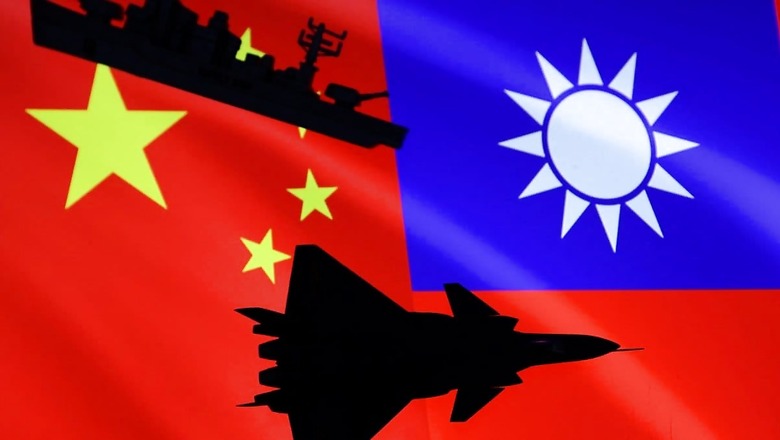
views
China is increasingly flexing its military muscle to “intimidate” Taiwan and allowing the democratic island to meaningfully participate in the UN system would demonstrate the global body’s determination to unite for peace, Taiwanese Foreign Minister Joseph Wu said on Wednesday.
China’s expansionism does not stop at Taiwan and its use of gray-zone activities in the East and South China seas are designed to expand its power and substantiate its “hawkish” territorial claims, Wu said, days after Beijing came out with a new “map” reflecting its cartographic aggression.
Beijing considers Taiwan as its breakaway province and insists it should be unified with the mainland, by force if necessary. Taiwan, however, sees itself as completely distinct from China.
In an article, the Taiwanese foreign minister said Russia’s invasion of Ukraine is a reminder of how “autocracies care little” about causing “death and destruction” and that it is imperative to deter similar threats to global peace and security.
On Monday, Beijing released the 2023 edition of the so-called “standard map of China” that includes Taiwan, the South China Sea, Arunachal Pradesh and Aksai Chin as Chinese territory. India has dismissed the ‘map’ and lodged a strong protest with China over it.
Taiwan, a democracy that is home to over 23 million people, continues to confront challenges from China.
In the piece, released to the media here by the Taipei Economic and Cultural Center, said the people of Taiwan have remained calm in safeguarding the status quo of peace and stability across the Taiwan Strait for decades.
“However, as China’s economic and military might has grown stronger, it becomes increasingly aggressive in flexing its military muscle to intimidate Taiwan, thereby threatening our democratic way of life,” Wu said.
“This includes sending warplanes and ships across the median line of the Taiwan Strait and encroaching into our air defence identification zones. It has also intensified gray-zone tactics, such as disinformation and economic coercion, in an attempt to wear down our will to fight,” he wrote.
The Taiwanese foreign minister said China’s “expansionism” does not stop at Taiwan.
“China’s use of gray-zone activities in the East and South China Seas are designed to expand its power and substantiate its hawkish territorial claims,” he said.
“In addition to signing a security agreement with Solomon Islands in the South Pacific, the PRC (People’s Republic of China) has been securing ports for future military use in the Indian Ocean. All of these maneuvers are causing grave concerns that peace is becoming more difficult to maintain,” he said.
Wu said the Taiwan Strait is “indispensable” to global security arguing that half of the world’s commercial container traffic passes through it each day.
“Taiwan produces the majority of the world’s semiconductors and plays a key role in global supply chains. Any conflict in the area would have disastrous consequences for the global economy,” he said.
Describing the United Nations as the best platform for global discourse, he said time has come for allowing it to be part of the UN system.
“UN officials speak often of joint solutions, solidarity, and inclusion in tackling the pressing issues of our time. Taiwan is more than willing and able to take part in these efforts,” he said.
“However, Taiwan continues to be excluded from the UN due to China’s distortion of UN General Assembly Resolution 2758,” Wu said, “This resolution neither states that Taiwan is a part of the PRC nor gives the PRC the right to represent the people of Taiwan in the UN and its specialised agencies,” he added.
He claimed that “misrepresentation” of Resolution 2758 “contradicts” the basic principles upheld by the UN Charter and must be “rectified”.
“In recent years, bilateral and multilateral forums have repeatedly emphasized that the peace and stability over the Taiwan Strait is indispensable to global security,” Wu said.
“While we can all agree that the war must be avoided, how to best do so requires inclusion, dialogue, and, most of all, unity,” he said.
Wu further said that “it is vital to make China and other authoritarian governments aware that they will be held accountable and to urge them to settle differences through peaceful means.” “Allowing Taiwan to meaningfully participate in the UN system would benefit the world’s efforts to address pressing global issues,” he added.
Though India and Taiwan do not have formal diplomatic ties, the bilateral trade relations have been on an upswing.
In 1995, New Delhi set up the India-Taipei Association (ITA) in Taipei to promote interactions between the two sides and to facilitate business, tourism and cultural exchanges.
India-Taipei Association has also been authorised to provide all consular and passport services.
In the same year, Taiwan too established the Taipei Economic and Cultural Center in Delhi.



















Comments
0 comment